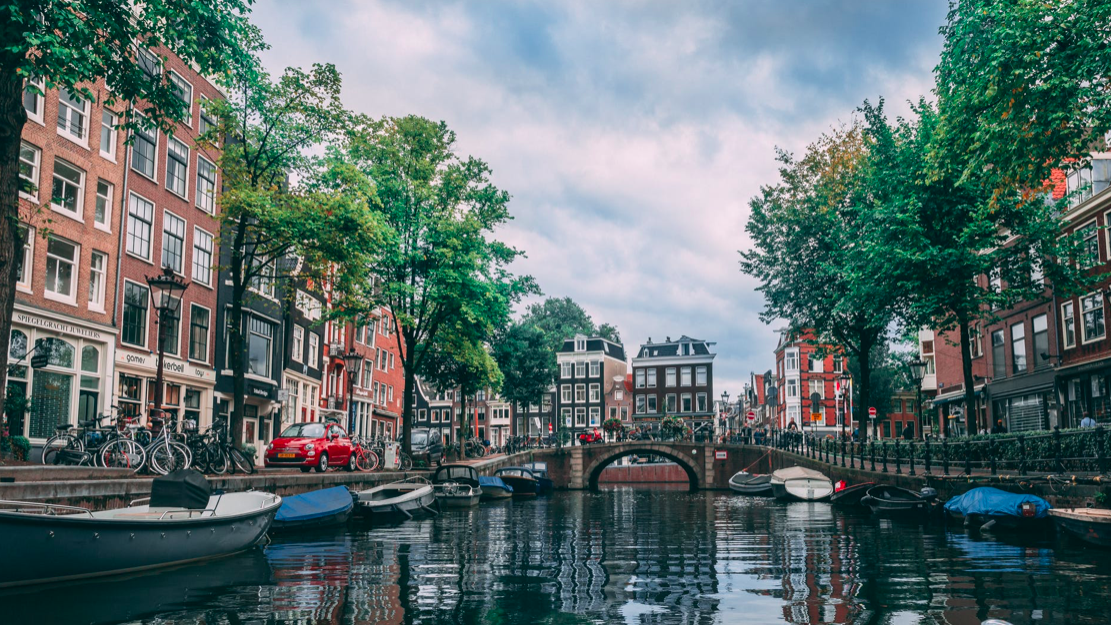We’ve lived through uncertain times these past few months, so you might be wondering whether you should still go ahead and buy a house in the Netherlands during these weird times. Coronavirus has impacted us all in different ways and the housing market is also a tad bit different, so we sat down with Wouter Hofstee Holtrop from Expat Mortgages to have a chat about buying a house in corona times.
Expat Mortgages is a Dutch mortgage agency operating all across the Netherlands, and helps internationals navigate the Dutch property market. They’re the experts on the housing market here, so we’ve teamed up with them to bring you this article about what you can expect if you want to buy a house in the Netherlands during the coronavirus crisis. We asked Wouter some of the questions we’d been wondering about when it comes to what the Dutch housing market looks like during the coronavirus crisis.
What is the housing market like at the moment in the Netherlands?
When you’re buying a house, your first question is probably about what the housing market looks like at the moment. That can massively influence where and what kind of house you decide to buy, as well as if you can buy what you want. The importance of this question has only increased in recent times, as everything has been uncertain due to coronavirus- so of course, it was the first thing we asked Wouter when we had our chat with him.
Luckily, according to Wouter, the housing market in the Netherlands has remained relatively stable; and, as the country (hopefully) comes out of the crisis for good, that doesn’t look set to change. Although some experts and banks believed that house prices would crash at the beginning of the coronavirus crisis, they’ve been proved wrong by the evidence, Wouter says. House prices around the country have remained steady or even increased. This is really all down to the fact that there has been a housing crisis in the Netherlands for the past few years, and even with coronavirus at play, that shortage isn’t going anywhere (more below on what the housing market in the Netherlands might look like in the long term).

How do house viewings work during the coronavirus crisis?
Given that the Dutch government has been encouraging people to stay home as much as they can, another question you might be wondering about is how house viewings work. “At the beginning of the crisis, house viewings dropped by 65%, but that number has now risen again,” Wouter says. Generally speaking, how houses viewings work hasn’t changed all that much, though of course you can’t shake hands when you meet your estate agent. You should also keep a 1.5m distance from each other and wash your hands often.
Something you might not realise, Wouter notes, is that house viewings are a bit more pleasant than usual at the moment. If you’ve ever gone to a house viewing before coronavirus, then you might remember that sometimes you would have up to 25 people crowded into a small apartment. Now, of course, that doesn’t happen. You’ll have a viewing alone with your estate agent, and this can really work to your benefit, Wouter adds. “You can ask more questions, take your time, and you’re alone in the property.”

Are banks still giving out mortgages in the Netherlands during coronavirus?
Now, unless you’re in a very good financial position, you’ll probably need to get a mortgage to buy a house in the Netherlands. Many of us will have panicked memories of the 2008 crisis, when it became more difficult to get a mortgage from most banks. However, this hasn’t happened with the coronavirus crisis, even though there have definitely been fears that this was a possibility.
Banks are definitely still loaning money to people who want to get a mortgage. The usual requirements will, of course apply: among others, that you have either an indefinite contract or proof that you’re otherwise in stable employment. Banks also have more questions than usual, and require a bit of extra documentation. You’ll be asked to provide a document explaining how coronavirus has impacted the company you work for, and they might also check to see if you have extra savings, so that you could pay the mortgage for a few months if you were to lose your job, for example.
However, Wouter says that not a single client of Expat Mortgages has been turned down by a bank as a result of these new requirements. One of their clients was even a freelance hospitality worker, and was still able to get a mortgage. The most important thing is to approach the right bank, which is exactly what Expat Mortgages can help you with. They don’t work with any particular bank: instead, they do all the research to make sure that they know what each bank can offer you.
If you feel like your situation is a bit special, or just that you’d like a second pair of eyes on it before going to a bank, then we really recommend getting a mortgage broker like Expat Mortgages.

New rule makes it easier for renters to become homeowners in the Netherlands
Also, in some ways, getting a mortgage might be a little easier these days, Wouter pointed out. Some of us might have already experienced the frustration that is not being able to get a mortgage, even though you would pay less for it than what you currently pay in rent. Celebration time: that’s no longer the case for many people! A new workaround now makes it possible for an “explain” document to be submitted to the bank.
This document basically allows you to get a slightly higher mortgage if you can show that you’ve been paying €1000 a month in rent (or more) and still managed to save alongside. That could also apply if you’ve been paying back a student loan every month, and also managed to save alongside. Basically it’s all about showing that you can definitely pay your mortgage with cash to spare.
What is the housing market like in Amsterdam?
Now, we know our audience: you guys are often interested in Amsterdam specifically. So how is the housing market looking in Amsterdam at the moment? After all, the Dutch capital is often an exception to the rest of the country in a whole host of ways. The housing market in Amsterdam is often a bit faster to react to economic changes, and things also just tend to move faster there when it comes to buying a house. “The whole process can take 5-6 weeks in other parts of the country,” says Wouter, “but in Amsterdam you’re looking at 3-4 weeks.”
Generally speaking, not much has changed in Amsterdam. In the first quarter of this year, which includes the first month of the coronavirus crisis, house prices rose rather than fell. The only sector of the market that is functioning a bit differently at the moment is the higher segments, which have been imaged by the ban on Airbnbs in the city centre and by fewer international buyers. But high demand continues, so you probably won’t be finding your dream Amsterdam house for a few euro any time soon.
The role of digital signatures during corona times
One other thing which has changed a little in the process of buying a house in corona times is signing documents. Digital signatures are more commonly accepted by banks, at least as a temporary measure. This was actually something that was already in progress, Wouter explained: for many years banks and notaries have been encouraged to accept digital signatures, but have been slow about doing so. Coronavirus has finally encouraged a wider acceptance of the practice.
Digital signatures extremely helpful if you’re buying a house while abroad, for example (many expats returned to their home countries at the beginning of the crisis). It’s also helpful if you have an underlying medical condition that makes you feel unsafe physically meeting people at the moment; or if you need to quarantine for other reasons. Something you might also not think about is how often you would usually have to meet up with your notary and the bank: at least twice with the notary and about the same with the bank. It’s really great to see this sort of contact being minimised while we fight coronavirus.
What can we expect from the Dutch housing market in the long run?

What can we expect in the long run from the Dutch housing market? Some analysts think that we could see a slight drop in housing prices as a result of coronavirus, particularly if we get a second wave, or the expats who have left the Netherlands do not return in the long term. However, the housing shortage in the Netherlands is also pretty severe, so Wouter says it’s a possibility that house prices wouldn’t drop regardless.
The housing crisis has been a long-term problem in the Netherlands, and has arisen because of several factors. Over the past decades, we’ve seen the number of people who live together in a house decline (smaller families are becoming more common), while the population has continued to grow. The regulations brought in to deal with the nitrogen crisis made it temporarily more difficult for new building work to take place. The Netherlands is also just a small country with a rising population and not a lot of free space. Airbnb rentals have also cramped the market in major cities like Amsterdam, though this shouldn’t be a problem any more.
We can also expect Brexit to play a role (remember Brexit?). Major companies are already relocating to the Netherlands, and that trend is likely to continue. They will bring at least some of their workers with them, which means that there will be an increase in demand for housing for expats. All this together means that even if there is slightly less demand for houses as a result of the coronavirus crisis, the prices of houses probably won’t be changing much in the near future.[td_smart_list_end]
Navigating the Dutch housing market with Expat Mortgages
It’s always good to have an expert on your side when you’re making a major life decision: and I think we can all agree that buying a house is certainly that. Especially in these uncertain times, when everyone has a theory on what’s going to happen to the economy, it’s so worth talking to someone who really knows their stuff. Even though we’re not personally buying a house, sitting down (virtually) with Wouter and asking him all our questions made everything so much clearer. If you’re in the process of buying a house, or are just curious about the possibilities, definitely head over to Expat Mortgages and ask them for advice.
What are your experiences of buying a house in the Netherlands? Let us know in the comments below.
Feature Image: Kata Pal/Pexels



What is the name of the document from the following sentence ?” This document basically allows you to get a slightly higher mortgage if you can show that you’ve been paying €1000 a month in rent (or more) and still managed to save alongside. “
Hey Mylène,
For some banks this may be an actual form that they have designed, but more likely it is a rental statement (huurverklaring) that you develop alongside your mortgage advisor.
In this rental statement, you’ll lay out your current budget to show that you’ve been able to pay over 1000 euros in rent and still been able to save money. You’ll then submit this to the bank for their consideration.
Hope this helps!
– Sam, DR